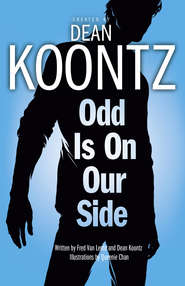По всем вопросам обращайтесь на: info@litportal.ru
(©) 2003-2024.
✖
Jane Hawk Thriller
Автор
Год написания книги
2019
Настройки чтения
Размер шрифта
Высота строк
Поля
PROCEED AT RISK
PAVEMENT FAULTS
SLIDE ZONE
“There were wildfires last summer and heavy rains this winter,” says Charlie. “Always a bad combination. Let’s have a look.”
Here and there a swath of pavement is missing, as if it’s been sloughed away by torrents of racing water, and in its place is a temporary rampart of compacted soil topped with gravel. At each of these points, the hillside to the right is a steep slope of raw earth perhaps inadequately restrained by a makeshift retaining wall of portable concrete barricades. Otherwise the pavement is either in decent condition or only fissured and potholed.
Some streetlamps are missing, others are fallen over, and all are dark. For the last few blocks, the residences have been only on the left side of the street, many with lights aglow. Now the houses are dark and without landscape lighting. Some are surrounded by recently erected chain-link fences bearing signs sternly warning against trespassing.
The seventh and last of the dark structures is the address at which they expect to find Ashok, Doris, and Vikram Rangnekar—aunt, uncle, and the nephew who is a fugitive from the law. It is an enormous residence on at least an acre, standing among live oaks, the style of its architecture not definable in the gloom. This property is also fenced with chain-link unsuitable to an upscale neighborhood. Beyond the gate, a Mercury Mountaineer is parked in the driveway.
When Charlie and Mustafa get out of the bespoke G550 Squared, soft sheet lightning flutters through the rumpled clouds, as though a bright winged legion above the pending storm is hastening to the Apocalypse. There is no thunder flowing in the wake of the flying flame, and the night is uncannily still, all wind deep in a pocket of the storm, waiting to be spent.
The three men from the Cadillac precede Charlie and Mustafa to the gate in the fence: Pete Abelard, Hans Holbein, Andy Serrano. Pete and Hans have cleared their sport coats from belt holsters, and each has a hand on the grip of his weapon, ready to draw and fire, although Vikram Rangnekar is not considered likely to be violent.
By the time Charlie follows the trio, a man has exited the Mountaineer in the driveway. He has come to the farther side of the gate, through which he is speaking to Andy Serrano, who has flashed his FBI badge rather than Homeland ID, because in spite of several unfortunate recent directors, the Bureau is still held in higher regard by the public than is Homeland. Andy is shining a flashlight on this fortysomething Latino, who seems neither in awe nor afraid, his stance relaxed and his face composed.
Because this Latino—Jesus Mendoza—appears unarmed and cooperative, Charlie moves to the gate and shows his badge and takes charge of the scene. As Mendoza swings open the barrier at Charlie’s demand, he denies knowing anyone named Rangnekar and insists that the owners of the property are Norman and Dodie Stein, who have been his employers for nearly twenty years. He is a full-time gardener and jack-of-all-trades.
On his smartphone, Charlie has photos of Ashok, Doris, and Vikram, which he shows to Mendoza.
“No, sir. Not him. Not her. No, sir, not him, either. I haven’t ever seen these people.”
According to Bureau investigators, Vikram Rangnekar formed a limited liability company, Smooth Operator Development, twenty-six months earlier. Two months thereafter, Smooth Operator formed a limited partnership called Chacha Ashok. Chacha is Hindi for uncle, specifically for an uncle who is your father’s brother. Sixteen months ago, Chacha Ashok, L.P., had purchased this residence in La Cañada Flintridge.
“This house,” Charlie assures Mendoza, “is on the property-tax rolls as owned by a limited partnership controlled by Vikram and Ashok Rangnekar. Ashok and Doris Rangnekar are also registered to vote in this district.”
“There is some terrible mistake, sir. I am sad to say you have been misled. But then I know nothing of taxes and voting. To me, politics seems like a sickness, and I own no house. Until two months ago, I lived here, in an apartment above the garage.”
Mendoza is polite, self-effacing, but he lacks one quality that Charlie most appreciates in citizens with whom he must interact in situations like this. Although Mendoza is humble, he is not meek. Humility is good; Charlie Weatherwax expects any subject of an interrogation to be no less than humble, but humility is not enough. In urgent cases like this, he never trusts an interrogee until he has reduced him all the way to meek submission.
He puts away his smartphone and looms over Jesus Mendoza, who is even two inches shorter than Mustafa al-Yamani. He makes a point of exaggerating the Spanish pronunciation of the man’s name, calling him Hey-Seuss, emphasis loud on the first syllable, as if he is calling out to the author who wrote How the Grinch Stole Christmas. “Hey-Seuss, is it? Listen to me, Hey-Seuss, and listen good. If you’re covering for Vikram Rangnekar, Hey-Seuss, I’ll bust your skinny ass and put you away in some shithole of a federal prison for ten years. We’re going to search this place from top to bottom, Hey-Seuss, and you will assist us without delay.”
Mendoza smiles and shrugs. “Of course. We know that the law is good, if a man use it lawfully.”
As sheet lightning fluoroscopes the body of the impending storm and shadows like revealed malignancies briefly caper around Charlie, he senses that he has been rebuked. “Exactly what’s that supposed to mean?”
Instead of answering the question, Mendoza says, “Because of recent mudslides, the city has condemned the property. Mr. and Mrs. Stein are contesting the condemnation in court. Deep caissons can be installed, retaining walls built, the home saved. If the law will allow. Meanwhile, no one is permitted to live in the house.”
“So what are you doing here?” Charlie asks.
“Sir, you see, I can no longer garden or make repairs. I work the night to keep out vandals who might damage the house before it can be saved.”
“Do you think we will vandalize the place, Hey-Seuss?”
“No, sir. Of course not. You are the law. Come with me. I will show you there is no Rangnekar and never was.”
11 (#ulink_77c11f35-2973-5e60-9af1-8fc6f12b866a)
A flurry of light fanning through enfolded clouds. No thunder in the mute throat of the imminent storm. In the hard glare of the security lamps, row after row of identical storage units stood like sleek mausoleums in an automated graveyard for antiquated robots in a machine civilization with pretensions to an immortal soul.
The facility was quiet on this Friday night. An owl urgently queried them from some roost unseen.
When Vikram unlocked the door to his unit and rolled it up, the clatter echoed along the serviceway, suggesting to the owl that silence was safer.
Vikram switched on the light. Several cardboard cartons occupied a small portion of the storage space, with a hand truck to move them.
“A satellite dish 1.1 meters in diameter,” he said. “Transmitter, receiver, satellite modem, plus all the cables and gimcracks to install a VSAT system.”
“For what purpose?” Jane asked.
“To connect with the Internet via satellites through a series of Internet service providers, so we can go online from any point on the road, weather permitting, and switch then from one ISP account to another at the first indication someone is tracking our signal.”
“You can do that?”
“I can do that from a mobile platform.”
“What mobile platform?”
“I’m thinking a motor home.”
Jane indicated the cartons. “What did all this cost you?”
“Nada. Used my personal back doors. This gear was ostensibly ordered by the Department of Education, through its Office of Educational Research and Improvement, and express-shipped by the manufacturer to an elementary school in Las Vegas. The school has been closed for two years. My cousin Harshad camped out on its doorstep, waiting for the FedEx delivery, and then he brought this equipment here, as we prearranged.”
The care Vikram had taken to acquire the equipment and his talk of using multiple Internet service providers began to suggest to Jane the shape of his intentions. “Have you already set up several accounts with satellite ISPs?”
“More than several. Thirty-six. One is held by the Bureau of Indian Affairs, another by the Fish and Wildlife Service, another by the United States Mint, another—”
“I get it,” she said. “No one in these agencies is aware of these ISP accounts.”
“They’re shadow-booked. And only I have the password that’ll activate them.”
During the weeks that she’d been consumed by this crusade, Jane had endured many moments when ultimate triumph seemed impossible, but she’d never grown despondent. Despondency drained your energy, made every effort seem useless; it led to despair, and those who surrendered to despair were committing themselves to failure and perhaps to death. Her precious child was a lamp in this dark world, and she owed him confidence, energy, determination; she owed him everything. For all the times that triumph had felt beyond her grasp, there had been comparatively few moments when hope had been more than a pilot light, when it had burned at full flame in her heart. But now, for the second time in an hour, she felt as if the world was bright with promise; belief and trust unified within her mind and heart, so she knew that special purity of hope called faith—faith that she’d succeed, that her enemies would fail.
Вы ознакомились с фрагментом книги.
Приобретайте полный текст книги у нашего партнера:
Приобретайте полный текст книги у нашего партнера:











